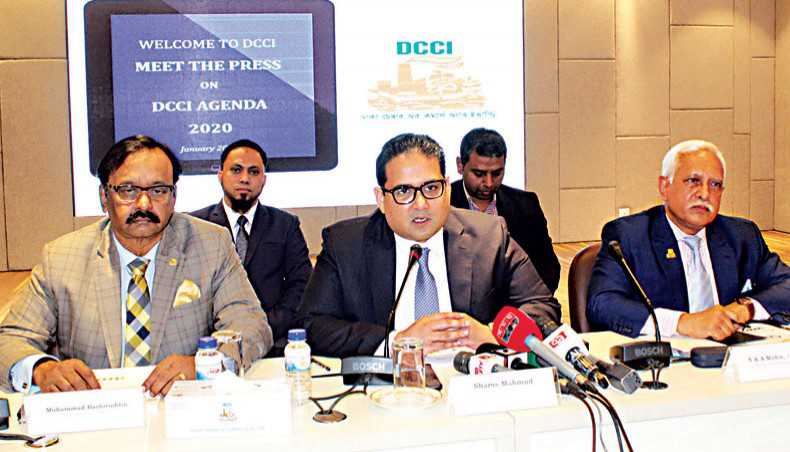Govt efforts on doing business, FDI inflow not adequate: DCCI

Image collected
The government’s reform initiatives regarding competitiveness, ease of doing business and foreign direct investment are not adequate to improve the indicators, said Dhaka Chamber of Commerce and Industry president Shams Mahmud on Monday.
He made the comment at a press conference on the DCCI’s priorities for the year 2020, held at the DCCI office in the capital.
Shams said trade tariff, instability in financial system, regulatory framework and infrastructure were the worst areas causing a decline in the country’s competitiveness.
The DCCI new president also mentioned that Bangladesh ranked the 168th in ease of doing business index among 190 countries while it ranked the 105th in Global Competitiveness Index among 141 countries that should be improved.
The DCCI would provide suggestions regarding amending some provisions of the company act, including merger and acquisition and bankruptcy which hinder doing business in the country, he said.
Shams said that corporate tax was much higher than the global average, which was a critical challenge for encouraging new local and foreign investment in the country.
The DCCI would pursue the government for a gradual decrease in corporate tax at a progressive rate of 5 per cent, 7 per cent and 10 per cent respectively in 2020-21, 2021-22 and 2022-23, he said.
He said that advance tax on importing raw materials and capital machinery hindered new investment.
‘Therefore, it will pursue the government for removing the AT for the export-oriented manufacturing sector.’
Now VAT rebate is allowed for businesses who pay 15 per cent VAT, but he demanded that VAT rebate facility for other slabs like 5 per cent, 7 per cent, 7.5 per cent and 10 per cent VAT.
The slabs would boost small and medium enterprises, he said.
He said the government moved to implement 9 per cent lending rate for industrialisation, and it should include the SME sector for the facility.
Shams said, ‘Export concentration in RMG, which contributes 84 per cent of the country’s total exports, may cause economic vulnerability, so we need to develop other sectors as well to offer backup for the RMG.’
He urged the government to offer bonded warehouse and back-to-back LC facilities to leather products, tax rebate and new technology adoption to promote other sectors.
Nearly 80 per cent of the county’s exports is destined to North America and Europe and products sophistication has remained almost static, he claimed.
Bangladesh is not gaining sufficient market access to Africa, North America and Asia and not receiving enough investment, he said.
‘Effective economic diplomacy is needed to address the tariff, non-tariff and post economic graduation challenges to sustain economic cooperation with relevant economies,’ he said.
He requested the government to pursue for getting GSP facility.
According to a study of a2i, around 40 per cent of all jobs in RMG and textile, agro food, tourism and leather sectors in Bangladesh has risk of loss due to automation, Shams said.
He urged for strong collaboration of the National Skills Development Authority and the Bureau of Manpower Employment and Training for need-based skill development.
Low participation of institutional and individual investors, absence of bond market, listing of small capitalised companies, lack of good companies and corporate governance limit potentials of the country’s capital market for long-term financing.
He urged to develop effective bond market and functioning of DSE SME platform engaging SMEs, market makers and issue managers to overcome the SME financing gap.
He requested the government to allow the private sector for distribution and transmission of energy.
Moreover, the government needs to encourage local explorers to explore gas, he said.
DCCI senior vice president NKA Mobin and vice president Mohammad Bashiruddin were present, among others, at the conference.
Source: https://www.newagebd.net
Previous Story
- Economy not gloomy, but challenges remain: DCCI
- Good governance stressed for disciplined financial market
- Credit lines stressed for maximizing export competitiveness
- Industries minister emphasizes improving product, services quality
- Corporate tax: Bangladeshi entrepreneurs pay highest in South...
- DCCI for separate SME bank
- Study suggests formalizing electric vehicles for employment and...
- ATA Carnet System implementation will help boost trade:...